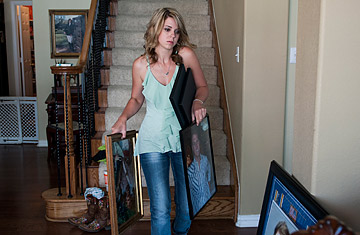
Grand Praire, TX. Rebecca Morrison with some of her husband Ian's belongings in her parents homes. Ian, an AH-64 Apache Helicopter pilot in the U.S. Army committed suicide on March 21, 2012. Ian chose 'Ike' for Rebecca.
(6 of 10)
When troops return from deployment, they are required to do self-assessments of their experience: Did they see people killed during their tour? Did they feel they had been at risk of dying? Were they interested in getting counseling for stress or alcohol use or other issues? But a 2008 study found that when soldiers answer questions anonymously, they are two to four times as likely to report depression or suicidal thoughts. Independent investigations have turned up reports of soldiers being told by commanders to airbrush their answers or else risk their careers. A report by the Center for a New American Security cited commanders who refuse to grant a military burial after a suicide for fear that doing so would "endorse or glamorize" it.
The U.S. Department of Veterans Affairs (VA) and all the services have launched resiliency-training programs and emergency hotlines, offering slogans like "Never leave a Marine behind" and "Never let your buddy fight alone" that try to speak the language of the unit. Last year the Pentagon released a video game meant to allow soldiers to explore the causes and symptoms of PTSD from the privacy of their homes. "We want people to feel like they are encouraged to get help," says Jackie Garrick, who runs the new Defense Suicide Prevention Office. "There are a myriad of ways you can access help and support if you need it."
But faith in that commitment was shaken this year when Army Major General Dana Pittard, commander of the 1st Armored Division at Fort Bliss, Texas, complained on his official blog that he was "personally fed up" with "absolutely selfish" troops who kill themselves, leaving him and others to "clean up their mess. Be an adult, act like an adult, and deal with your real-life problems like the rest of us," he continued. He later said he wanted to "retract" what he called his "hurtful statement," but he didn't apologize for what he said. Many soldiers and family members believe Pittard's attitude is salted throughout the U.S. military.
Just a Lovers' Quarrel
In August 2010, Leslie went to McCaddon's commanding officer at the hospital. She didn't tell Michael. "It was the scariest thing I've ever done," she says. She recalls sitting in the commander's office, haltingly laying out her concerns--McCaddon's history of depression, his struggle to meet his high standards while doing right by his family. She was hoping that maybe the commander would order him into counseling and defuse the stigma somehow: he'd just be following orders. She watched the officer, a female colonel, detonate before her eyes. "No one at the medical school told me he had a history of depression, of being suicidal," Leslie recalls her shouting. "I have a right to know this. He's one of my residents. Why didn't anyone tell me?" The commander was furious--not at Leslie, exactly, but at finding herself not in command of the facts.
The colonel called several colleagues into the room and then summoned McCaddon as well. Leslie registered the shock and fear on his face when he saw his wife sitting with his bosses. "I was shaking," she says. "I told him I continued to be concerned that his depression was affecting our family and that I was really concerned for his safety but also for the well-being of our children and myself."
